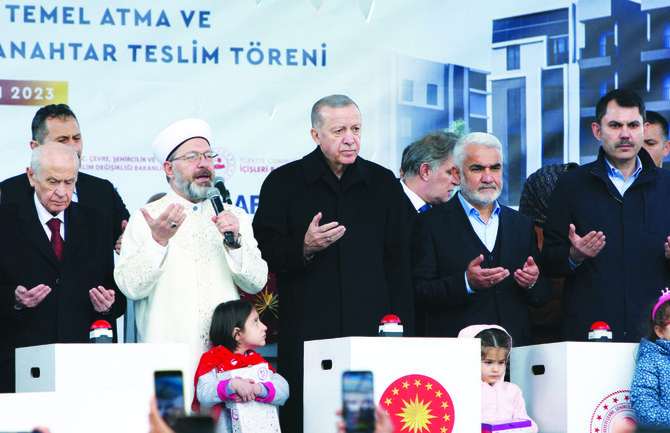ANKARA: Ali, a 23-year-old student, lost everything in Turkiye’s earthquake.
His parents are missing and his ancient hometown, Antakya, lies in ruins.
To fight back, Ali, who like many survivors declines to give his full name, has launched a drive to ensure that more than 3 million people displaced by the February disaster can vote in next month’s general election.
The May 14 ballot promises to be perilous for President Recep Tayyip Erdogan, a dominant leader forced into the unusual position of apologizing for his government’s response to Turkiye’s worst disaster of modern times.
Rescuers and relief workers took days to reach some ravaged areas, creating a sense of abandonment and directing anger at officials for a death toll that has topped 50,000.
“It’s important to reflect this anger at the polls,” said Ali, who now lives in Ankara.
BACKGROUND
May 14 ballot promises to be perilous for President Recep Tayyip Erdogan, a dominant leader forced into the unusual position of apologizing for his government’s response to Turkiye’s worst disaster of modern times.
With friends, he launched an appeal on Twitter asking political parties to pay the bus tickets of students who had to leave Antakya but want to return to cast their votes.
The main opposition CHP party has pledged its support.
People who sought shelter in cities such as Ankara, Istanbul and Mersin on Turkiye’s southern coast had until April 2 to register their new voting address.
Those who missed out have to return to their ruined cities to cast ballots. Erdogan’s opponents view the early deadline as a covert government effort to suppress the protest vote.
“People lost loved ones and everything that was precious to them. Most were in no condition to take care of their election registration,” said Ali Oztunc, a CHP deputy representing Kahramanmaras, near the epicenter of the 7.8-magnitude quake.
Only 50,000 of the 820,000 registered voters in Kahramanmaras were able to change their registration, according to Oztunc, who estimates that half of the province’s residents have left.
That means hundreds of thousands will have to somehow find their way back to take part in what is widely seen as Turkiye’s most important election in its post-Ottoman history.
“It is impossible to transport so many people,” said Oztunc.
“It would take thousands of buses and that would create a giant traffic jam. No party can organize that.”
The CHP’s leader, Kemal Kilicdaroglu, is the opposition’s joint candidate in the knife-edge vote.
The party’s vice president, Onursal Adiguzel, openly accuses officials of trying to tamp down turnout among the displaced.
“The authorities could have extended the deadline to assist with the registration,” Adiguzel said.
“But they are afraid of the victims,” he said. “They are doing everything to hinder the vote.”
Forced to leave Kahramanmaras, father-of-two Abdullah said he was actively discouraged by civil servants from changing his registration address.
“I was told that I would lose my rights to public aid for earthquake victims,” Abdullah said at his temporary home in Ankara.
“So I kept my address in Kahramanmaras. But I don’t know how I’ll be able to go there and vote.”
At a shelter in the suburbs of Ankara, only 120 of the 525 displaced families had taken the necessary steps to change their legal address.
Eymen Gassaloglu, 34, who lives at the shelter with her two daughters, was determined to return to Antakya on election day — even if it meant sleeping in a tent.
“It’s about my future,” said Gassaloglu. “I’ll vote no matter what.”
Some said returning to the province would also give them a chance to monitor voting and report any irregularities.
Erdogan’s critics fear that voting lists will include people who went missing but not officially declared dead, creating room for manipulation by election officials.
“The authorities do not openly disclose the number of missing people. This is a concern,” Adiguzel, the CHP vice president, said.
Ozgur Yusuf Kavukcu, 45, managed to register to vote in Ankara. But most of his friends will have to return to Antakya, a ghost town where just a tiny fraction of the buildings has survived unscathed.
“I think free elections are impossible under such conditions,” Kavukcu said.
“But there is no other choice. We have already lost a lot with the earthquake. Losing the expression of our free will would be another disaster.”














